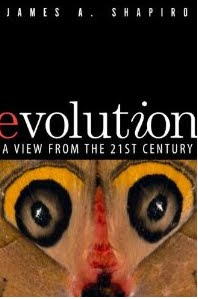The Nature issue containing the latest ENCODE Consortium papers also has a New & Views article called "Genomics: ENCODE explained" (Ecker et al., 2012). Some of these scientist comment on junk DNA.
For exampleshere's what Joseph Ecker says,
I would also ask, "How many of you have no idea how evolution could retain "useless" DNA in our genome?" Undergraduates who don't understand evolution should not graduate in a biological science program. It's too bad we don't have similar restrictions on senor scientists who write News & Views articles for Nature.
Jonathan Pritchard and Yoav Gilad write,
The real challenge from the ENCODE Consortium is that they question that understanding. They are proposing that huge amounts of the genome are devoted to fine-tuning the expression of most genes in a vast network of binding sites and small RNAs. That's not the picture we have developed over the past four decades. If true, it would not only mean that a lot less DNA is junk but it would also mean that the regulation of gene expression is fundamentally different than it is in E. coli.
For exampleshere's what Joseph Ecker says,
One of the more remarkable findings described in the consortium's 'entrée' paper is that 80% of the genome contains elements linked to biochemical functions, dispatching the widely held view that the human genome is mostly 'junk DNA'. The authors report that the space between genes is filled with enhancers (regulatory DNA elements), promoters (the sites at which DNA's transcription into RNA is initiated) and numerous previously overlooked regions that encode RNA transcripts that are not translated into proteins but might have regulatory roles.And here's what Inês Barroso, says,
The vast majority of the human genome does not code for proteins and, until now, did not seem to contain defined gene-regulatory elements. Why evolution would maintain large amounts of 'useless' DNA had remained a mystery, and seemed wasteful. It turns out, however, that there are good reasons to keep this DNA. Results from the ENCODE project show that most of these stretches of DNA harbour regions that bind proteins and RNA molecules, bringing these into positions from which they cooperate with each other to regulate the function and level of expression of protein-coding genes. In addition, it seems that widespread transcription from non-coding DNA potentially acts as a reservoir for the creation of new functional molecules, such as regulatory RNAs.If this were an undergraduate course I would ask for a show of hands in response to the question, "How many of you thought that there did not seem to be "defined gene-regulatory elements" in noncoding DNA?"
I would also ask, "How many of you have no idea how evolution could retain "useless" DNA in our genome?" Undergraduates who don't understand evolution should not graduate in a biological science program. It's too bad we don't have similar restrictions on senor scientists who write News & Views articles for Nature.
Jonathan Pritchard and Yoav Gilad write,
One of the great challenges in evolutionary biology is to understand how differences in DNA sequence between species determine differences in their phenotypes. Evolutionary change may occur both through changes in protein-coding sequences and through sequence changes that alter gene regulation.The problem here is the hype. While it's true that the ENCODE project has produced massive amounts of data on transcription binding sites etc., it's a bit of an exaggeration to say that "until now there has been little information about which genomic regions have regulatory activity." Twenty-five years ago, my lab published some pretty precise information about the parts of the genome regulating activity of a mouse hsp70 gene. There have been thousands of other papers on the the subject of gene regulatory sequences since then. I think we actually have a pretty good understanding of gene regulation in eukaryotes. It's a model that seems to work well for most genes.
There is growing recognition of the importance of this regulatory evolution, on the basis of numerous specific examples as well as on theoretical grounds. It has been argued that potentially adaptive changes to protein-coding sequences may often be prevented by natural selection because, even if they are beneficial in one cell type or tissue, they may be detrimental elsewhere in the organism. By contrast, because gene-regulatory sequences are frequently associated with temporally and spatially specific gene-expression patterns, changes in these regions may modify the function of only certain cell types at specific times, making it more likely that they will confer an evolutionary advantage.
However, until now there has been little information about which genomic regions have regulatory activity. The ENCODE project has provided a first draft of a 'parts list' of these regulatory elements, in a wide range of cell types, and moves us considerably closer to one of the key goals of genomics: understanding the functional roles (if any) of every position in the human genome.
The real challenge from the ENCODE Consortium is that they question that understanding. They are proposing that huge amounts of the genome are devoted to fine-tuning the expression of most genes in a vast network of binding sites and small RNAs. That's not the picture we have developed over the past four decades. If true, it would not only mean that a lot less DNA is junk but it would also mean that the regulation of gene expression is fundamentally different than it is in E. coli.
[Image Credit: ScienceDaily: In Massive Genome Analysis ENCODE Data Suggests 'Gene' Redefinition.
Ecker, J.R., Bickmore, W.A., Barroso, I., Pritchard, J.K. (2012) Genomics: ENCODE explained. Nature 489:52-55. [doi:10.1038/489052a]
Yoav Gilad
& Eran Segal

























